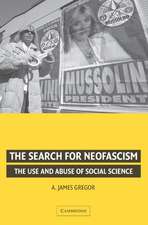Habermas: An Intellectual Biography
Autor Matthew G. Specteren Limba Engleză Paperback – 26 sep 2010
| Toate formatele și edițiile | Preț | Express |
|---|---|---|
| Paperback (1) | 204.48 lei 6-8 săpt. | |
| Cambridge University Press – 26 sep 2010 | 204.48 lei 6-8 săpt. | |
| Hardback (1) | 397.46 lei 6-8 săpt. | |
| Cambridge University Press – 26 sep 2010 | 397.46 lei 6-8 săpt. |
Preț: 204.48 lei
Nou
Puncte Express: 307
Preț estimativ în valută:
39.13€ • 40.94$ • 32.50£
39.13€ • 40.94$ • 32.50£
Carte tipărită la comandă
Livrare economică 03-17 aprilie
Preluare comenzi: 021 569.72.76
Specificații
ISBN-13: 9780521738316
ISBN-10: 0521738318
Pagini: 278
Ilustrații: 6 exercises
Dimensiuni: 152 x 228 x 16 mm
Greutate: 0.39 kg
Editura: Cambridge University Press
Colecția Cambridge University Press
Locul publicării:New York, United States
ISBN-10: 0521738318
Pagini: 278
Ilustrații: 6 exercises
Dimensiuni: 152 x 228 x 16 mm
Greutate: 0.39 kg
Editura: Cambridge University Press
Colecția Cambridge University Press
Locul publicării:New York, United States
Cuprins
Introduction; 1. The making of a '58er: Habermas's search for a method; 2. Habermas as synthesizer of German constitutional theory, 1958–63; 3. From the 'great refusal' to the theory of communicative action, 1961–81; 4. Civil disobedience, constitutional patriotism, and modernity: rethinking Germany's link to 'the West' (Westbindung), 1978–87; 5. Learning from the Bonn Republic: recasting democratic theory, 1984–96; Conclusion.
Recenzii
'This is an original work of the first importance both for our understanding of Habermas - one of the most important European philosophers and political theorists of the twentieth century - and the political-intellectual history of the West German republic. In addition, it is an exemplary work of intellectual history; it shows convincingly how the disciplinary approach can reveal meanings and dimensions of a highly abstract body of thought that a purely conceptual interpretation inevitably misses.' Gerald Izenberg, Washington University, St Louis
'This is a remarkable piece of work. No other book has situated Habermas's thinking within its intellectual-historical context as deftly and with such sophistication. Specter digs widely and deeply into the German-language writings of Habermas's interlocutors (as well as his named and often unnamed adversaries) in each of postwar Germany's periods of crisis. His argument for a continuity (traceable through attention to the law) in Habermas's corpus is courageous and convincing.' John P. McCormick, University of Chicago
'I have found Matthew Specter's Habermas: An Intellectual Biography immensely rewarding. By showing how deeply Jürgen Habermas was implicated in debates over constitutional and legal theory in West Germany from the mid-1950s onward, Specter has given me a far clearer understanding than I was previously able to muster of a figure who has a strong claim to being the most important political thinker of the second half of the twentieth century - and of today as well. This is contextualizing intellectual history of the best kind. Specter never treats Habermas's interventions as mere 'discourse.' On the contrary, he enters into the substance of the theoretical issues that Habermas has addressed. Indeed, his own clear voice can occasionally be heard as he enters into a discreet and respectful dialogue with a man who did much for the transformation of German public culture in the years since 1945.' Allan Megill, University of Virginia
'For lawyers, Jürgen Habermas is a political authority. His work symbolizes the change from 'state' to 'constitution,' from the ontological system of values to processuality, pluralism, and discourse. Matthew G. Specter pictures the 'political Habermas' and gives us a fascinating panorama of the intellectual scene in Western Germany on its way to 'normality'.' Michael Stolleis, Johann Wolfgang Goethe-University Frankfurt
'This book offers an eye-opening and richly historical account of the dominant intellectual figure of the Federal Republic. It enriches our understanding of Habermas, by placing him as part of the ongoing struggle to create a democratic Germany.' Adam Tooze, Yale University
'This biography is a must-read for understanding especially the early Habermas.' Timothy Lim, Religious Studies Review
'I read Matthew Specter's book with great pleasure and even astonishment. Like many American readers of Habermas, I knew little or nothing about his involvement in German politics, and even less about the German political and legal debates that form the background of many of his writings. Of course Habermas's arguments stand or fall on their merits. But until I read [this] superb book, I had no idea how much I was missing. From Specter I discovered that what seemed like arid abstractions in Habermas are not arid at all - indeed, are not even abstractions - once you know the views he was responding to. The book is excellent both as a piece of history and political theory. I would heartily recommend it to anyone with an interest in Habermas or, for that matter, in postwar German history.' David Luban
'This is a remarkable piece of work. No other book has situated Habermas's thinking within its intellectual-historical context as deftly and with such sophistication. Specter digs widely and deeply into the German-language writings of Habermas's interlocutors (as well as his named and often unnamed adversaries) in each of postwar Germany's periods of crisis. His argument for a continuity (traceable through attention to the law) in Habermas's corpus is courageous and convincing.' John P. McCormick, University of Chicago
'I have found Matthew Specter's Habermas: An Intellectual Biography immensely rewarding. By showing how deeply Jürgen Habermas was implicated in debates over constitutional and legal theory in West Germany from the mid-1950s onward, Specter has given me a far clearer understanding than I was previously able to muster of a figure who has a strong claim to being the most important political thinker of the second half of the twentieth century - and of today as well. This is contextualizing intellectual history of the best kind. Specter never treats Habermas's interventions as mere 'discourse.' On the contrary, he enters into the substance of the theoretical issues that Habermas has addressed. Indeed, his own clear voice can occasionally be heard as he enters into a discreet and respectful dialogue with a man who did much for the transformation of German public culture in the years since 1945.' Allan Megill, University of Virginia
'For lawyers, Jürgen Habermas is a political authority. His work symbolizes the change from 'state' to 'constitution,' from the ontological system of values to processuality, pluralism, and discourse. Matthew G. Specter pictures the 'political Habermas' and gives us a fascinating panorama of the intellectual scene in Western Germany on its way to 'normality'.' Michael Stolleis, Johann Wolfgang Goethe-University Frankfurt
'This book offers an eye-opening and richly historical account of the dominant intellectual figure of the Federal Republic. It enriches our understanding of Habermas, by placing him as part of the ongoing struggle to create a democratic Germany.' Adam Tooze, Yale University
'This biography is a must-read for understanding especially the early Habermas.' Timothy Lim, Religious Studies Review
'I read Matthew Specter's book with great pleasure and even astonishment. Like many American readers of Habermas, I knew little or nothing about his involvement in German politics, and even less about the German political and legal debates that form the background of many of his writings. Of course Habermas's arguments stand or fall on their merits. But until I read [this] superb book, I had no idea how much I was missing. From Specter I discovered that what seemed like arid abstractions in Habermas are not arid at all - indeed, are not even abstractions - once you know the views he was responding to. The book is excellent both as a piece of history and political theory. I would heartily recommend it to anyone with an interest in Habermas or, for that matter, in postwar German history.' David Luban
Notă biografică
Descriere
This book follows postwar Germany's leading philosopher and social thinker, Jürgen Habermas, through four decades of German political and constitutional struggles.

















